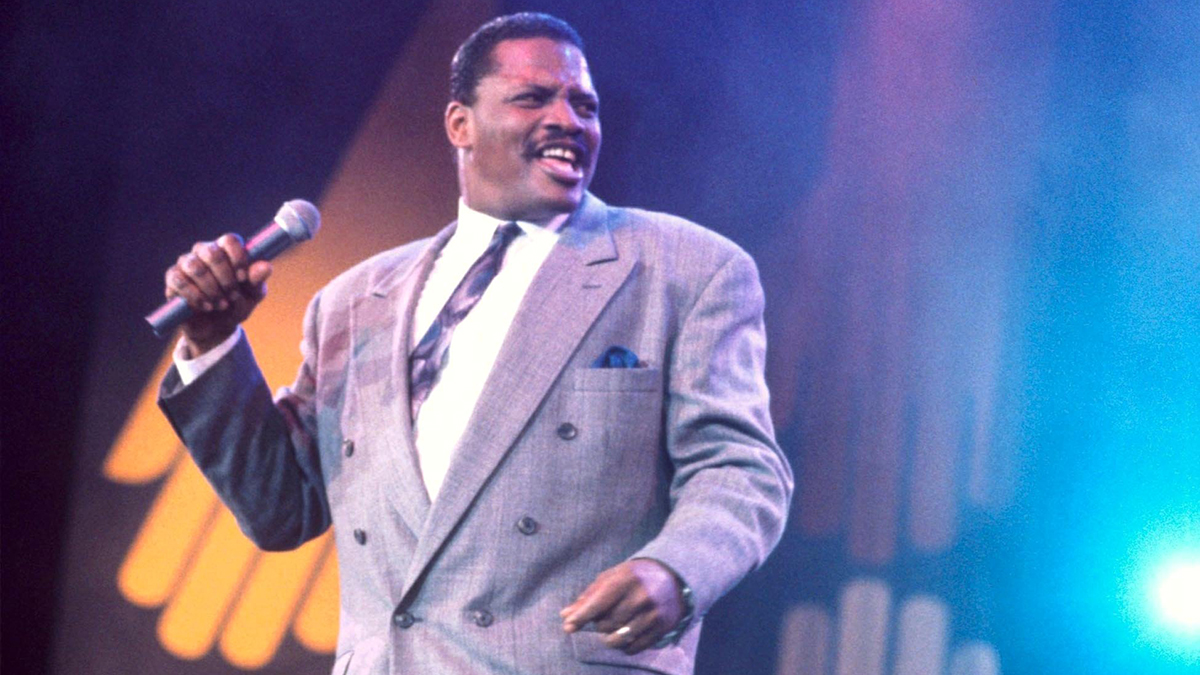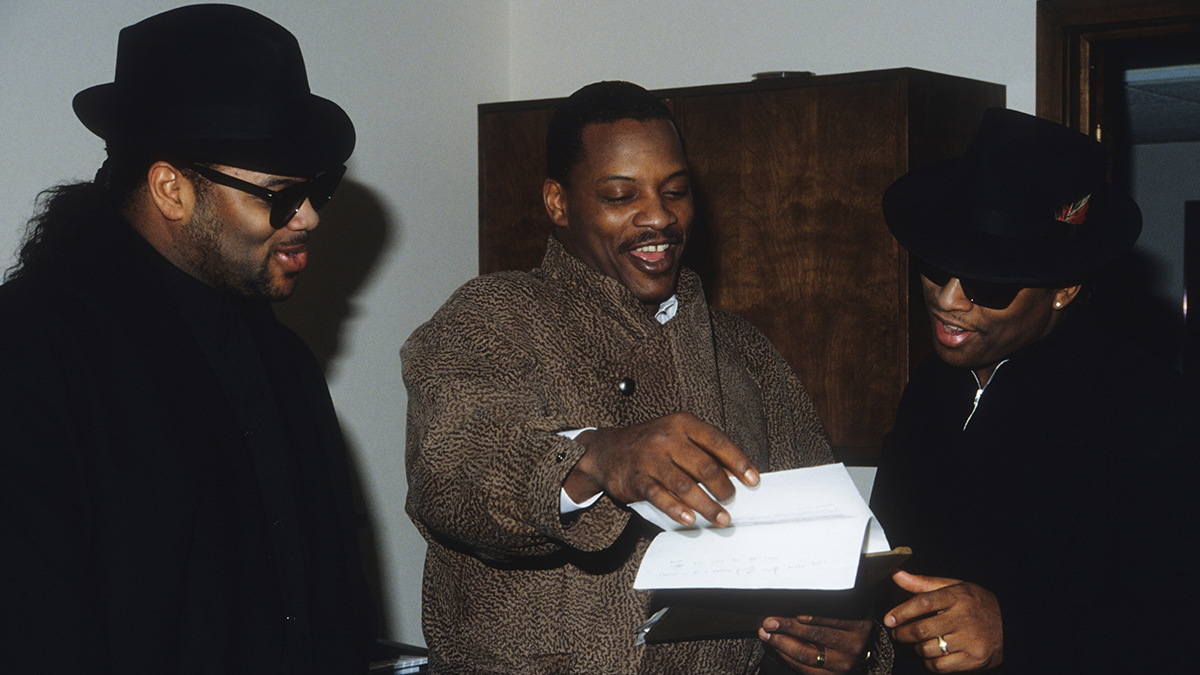Alexander O’Neal on being fired by Prince, rising again with Jam & Lewis and his 5 career-defining records
“Prince was from another planet. Whatever you can imagine musically and whatever you can imagine creatively, he could do it”

“A lot of American singers call the UK their second home, but there have been many times in my life when it kinda felt like my first home,” says R&B titan Alexander O’Neal. “There was something very different about the UK audience: a mutual respect. I felt so comfortable here that I actually had a house in London for 25 years, moving between the UK and Minneapolis. Your love solidified my career. It was you guys that made me.”
As anyone old enough to remember Top of the Pops in the mid-to-late-’80s will tell you, O’Neal isn’t joking. Between 1985 and 1990, songs like Criticize, Fake and If You Were Here Tonight turned him into an almost constant presence. Yes, he was making his mark on the R&B charts in the States, too, but his UK success was mainstream.
“Even after I released my first record, I still wasn’t quite sure about my voice… I wasn’t sure what I wanted to be,” he says. “The UK knew who I was. You made me believe in myself and you showed the world what I was gonna be.’
The 68-year-old is in the UK for his first live dates since the pandemic madness: a string of Giants of Soul shows with Rose Royce’s Gwen Dickie, Deniece Williams, Jaki Graham, Janet Kay and the Lighthouse Family’s Tunde Baiyewu.
“These days, people know me as a soul or an R&B singer, but when I was growing up, I used to listen to all kinds of music,” O’Neal tells us. “Everything from Otis Redding and James Brown to The Beatles and Elvis Presley.
“Like every kid, I was blown away by what Elvis was doing but, as I got older, it was Otis who really laid it out for me. He had everything. At the same time that he was taking hold of those up-tempo tunes, he would bring you to tears with a ballad. So much emotion in that voice.’
Although young Alex came from a singing family - his mom and almost everyone he knew sang in church - he always felt too shy to get up in front of a room full of strangers.
Get the MusicRadar Newsletter
Want all the hottest music and gear news, reviews, deals, features and more, direct to your inbox? Sign up here.
“I had other interests,” he remembers. “Hanging out with my friends, playing football. But no matter what else I was doing, I was always singing, too. Singing around the house, singing as I walked down the street. Subconsciously, there must have been something there, trying to get out.
“When my friends told me I had a nice voice, I thought they were making fun of me. Then, I heard them bragging to other people, telling the grown-ups. ‘You should listen to Alex. That cat can sing.’
“When I was about nine or ten, they persuaded me to sing for my friend’s mom. I remember feeling real self-conscious at first, but as soon as I started singing - it was a tune called That’s Enough - all the worry disappeared. And then my friend’s mom gave me a dime. Man, do you know what a dime could get you back in the early-’60s? I felt as rich as a king!”
When my friends told me I had a nice voice, I thought they were making fun of me.
Singing didn’t get serious until the early-’70s, when a call from a friend persuaded O’Neal to relocate from his native Mississippi to Minneapolis.
“I caught an overnight Greyhound bus and I saw the Twin Cities [Minneapolis and neighbouring Saint Paul] just as the sun was rising. I said to myself, ‘OK, enough is enough. No more messing around. You got 10 years to do something with music. If it don’t work, you sign up for lorry driving school’. That was my plan. I was gonna drive lorries. It was hard work, but those guys made good money.
“Fortunately, Minneapolis was the right place at the right time. I met Jimmy Jam and Terry Lewis, they invited me to join their band, Flyte Tyme. Then we met up with this other guy from Minneapolis, Prince, and formed a band called The Time.
“There’s a lot of controversy here… I got fired by Prince [O’Neal was replaced as singer in the band by Morris Day], Jimmy and Terry got fired by Prince. But I couldn’t hold no grudges because Prince was the one who kickstarted everything for us. He’d already had a couple of hits and he said, ‘Look, it ain’t just New York and LA and Chicago. We can do it here, too. We can put Minneapolis and the Twin Cities on the map’. He motivated us all.”
During that Flyte Tyme/The Time period, O’Neal spent many hours in the studio with Prince, but even after all these years he still struggles to describe the talent that was on show.
“He was from another planet. Whatever you can imagine musically and whatever you can imagine creatively, he could do it. No one was surprised when he turned into the Prince that we all got to know a couple of years later. Absolutely stellar… he was like nothing I’d seen before. He could do it all. Song after song after song. Some that I had the privilege of recording with him. I know that people are going through all those old tapes, so maybe we’ll get to hear some of that stuff.
“What a shame he ain’t here with us.”
Ironically, the Time controversy ended up working in O’Neal’s favour. After Jam and Lewis were given the elbow by Prince in 1983, they set out on their own as producers and songwriters, eventually hooking up with O’Neal when they needed a vocalist for their first album deal.

“Prince had a reputation for being a perfectionist and let’s just say that, in the studio, Jam & Lewis had a similar outlook. They were methodical. As a singer who had spent most of my time on the stage, I sometimes found the studio environment too contrived. Too boxed-in. A lot of the energy and soul comes from mistakes. The times when you ain’t perfect.
“But when I started hearing the results, I was smart enough to keep my misgivings to myself,” O’Neal laughs. “At first, there was a Prince kinda-vibe happening in the studio. You listen to some of those early tracks we were doing and it’s undeniable. It was almost as if Jam & Lewis had said, ‘OK, you fired us, but we can do it, too. We can make people dance’.
“Then, as we all became more confident in the studio, we started to put a twist on everything. Looking for our own sound. Sometimes, we did stuff with the drums or the vocals and we thought, ‘Well, that’s just stupid’. We’d listen to things the next day and they didn’t sound so stupid. They began to make sense.
Prince had a reputation for being a perfectionist and let’s just say that, in the studio, Jam & Lewis had a similar outlook.
“That was how we made my debut album,” O’Neal explains. “A lot of luck and destiny and fate and whatever the hell you want to call it. My first single, Innocent [1985], was a hit on the US R&B charts. My second single, If You Were Here Tonight, made the UK Top 20. Overnight, it was all happening. Money, fame, nice cars… all those things you dream about.’
Almost four decades of money, fame and nice cars have left their mark on O’Neal - look on the internet and you’ll find plenty of stories about the years spent battling an addiction to cocaine. He’s lost friends and musical contemporaries. He’s watched soul and R&B morph into funk and disco, rap and hip-hop. He’s watched in horror as musicians gunned each other down over the lyrics of a song.
“I don’t agree with a lot of what those modern guys sing about but, y’know… it’s a young man’s game. I wish them success and I hope success brings them what they want.
“I consider myself lucky that my success came slightly later in my life. I was almost 30 when I had my first hit and, although I still made some poor decisions, I managed to keep moving forward. I’d managed to get past those years when you’re a stupid punk and life comes crashing down around you. Thank God I had some life experience under my belt.”
Maybe that’s what saved him?
“Like I say, man… sometimes, it’s all down to destiny and luck.”
Alexander O’Neal on his 5 career-defining records
Innocent (1985)
“My debut solo single and my first big hit. Those few minutes of music changed my whole life.”
If You Were Here Tonight (1985)
“A lot was happening in that first year. A lot of singles, a lot of shows, my debut album. I couldn’t leave this one out because it’s become such an anthem. So many couples come up to me and say, ‘when we first met, this was our song!’”
Criticize (1987)
“If we’re talking about records that defined my career, this is the big one. Well, this and Fake. When you have a worldwide hit, you move up to a whole other league.”
What Is This Thing Called Love? (1991)
“Some people might be surprised that I included this one but, from a personal point of view, this was the record where I was finally beginning to appreciate my own voice. A lot of times, I would listen to my music and think, ‘Damn, it’s too nasally’. Not here; this one feels good. And you’ve also got that wonderful string part, working hard with the funk. If this song doesn’t make you dance, then you gotta be dead!”
Crying Overtime (1987)
“Why this one? A relatively unknown track. Something about the passion… the whole feel of the song. If I had to pick one song that describes who I am as a singer, this is it.”
TIckets for the Giants of Soul UK Tour are available now.











